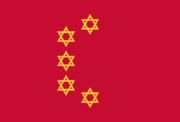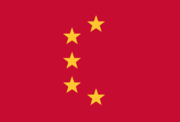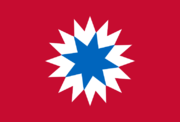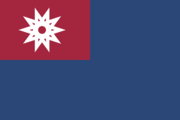Flag of Sanpantul: Difference between revisions
From MicrasWiki
Jump to navigationJump to search
No edit summary |
No edit summary |
||
| Line 11: | Line 11: | ||
The national '''Flag of Sanpantul''', also called the {{nihongo||三色旗 Sanshokuki|}} , is official flag of [[Sanpantul]]. The flag of Sanpantul is adopted in 1675 by [[Emperor Seiji]]. | The national '''Flag of Sanpantul''', also called the {{nihongo||三色旗 Sanshokuki|}} , is official flag of [[Sanpantul]]. The flag of Sanpantul is adopted in 1675 by [[Emperor Seiji]]. | ||
==Other flags== | |||
{{multiple image | |||
| align = center | |||
| direction = horizontal | |||
| width = | |||
| image1 = Spatull original flag.png | |||
| width1 = 180 | |||
| alt1 = | |||
| caption1 = The old name of Sanpantul during the Establishment Period. '''Spatull''' was to be settled in Eastern Keltia, but later remained on a small island in the Skerry Isles. The original flag was a six-kane symbol identical to the six-pointed Ashkenatzi star. It was later replaced with a pentacle to avoid confusion. | |||
| image2 = Sanpantul Communist Party flag.png | |||
| width2 = 180 | |||
| alt2 = | |||
| caption2 = Spatull's second flag, later renamed the nation name Sanpantul. The spatula flag is still used by the communists. Spatull's aim is to overthrow Sanpantul and the Royal Family and rename Sanpantul to the '''Spatull Socialist Republic'''. Except for those who are separated as ''Burakumin'', the party almost does not get votes. | |||
| image3 = Aran flag.png | |||
| width3 = 180 | |||
| alt3 = | |||
| caption3 = Flag of the former nation Aran (2011). Aran is still today the extremist of Sanpantul still uses this flag alongside the Sanpantul flag. Not officially used. | |||
| image4 = Xiangi flag.png | |||
| width4 = 180 | |||
| alt4 = | |||
| caption4 = Flag of ethnic people Xiangi. This flag was used unofficially when Sanpantul was fully independent. After the collapse, many Xiangi migrated to Phinbella and their numbers dwindled. Recently, Xiangi families have returned to the country. | |||
| image5 = Sapak flag.png | |||
| width5 = 180 | |||
| alt5 = | |||
| caption5 = The Sapak flag has a population of about 60,000 people. After the collapse period, they began to live widely in the north of the island. They later retreated to their former territories. | |||
| image6 = Sanpanese Burakumin flag.png | |||
| width6 = 180 | |||
| alt6 = | |||
| caption6 = Sanpanese ''Burakumin'' flag, Burakumin is a parsing word for naming the poor substrate. Later, the lower class adopted this name and even formed their own organizations. | |||
}} | |||
[[Category:Flags]] | [[Category:Flags]] | ||
[[Category:Sanpantul]] | [[Category:Sanpantul]] | ||
Revision as of 14:52, 26 August 2022
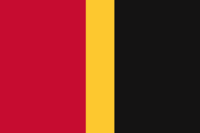 | |
| Use | National flag |
|---|---|
| Adopted | 2:3 |
| Designer | Prince Takashi |
The national Flag of Sanpantul, also called the (三色旗 Sanshokuki?) , is official flag of Sanpantul. The flag of Sanpantul is adopted in 1675 by Emperor Seiji.
Other flags
The old name of Sanpantul during the Establishment Period. Spatull was to be settled in Eastern Keltia, but later remained on a small island in the Skerry Isles. The original flag was a six-kane symbol identical to the six-pointed Ashkenatzi star. It was later replaced with a pentacle to avoid confusion.
Spatull's second flag, later renamed the nation name Sanpantul. The spatula flag is still used by the communists. Spatull's aim is to overthrow Sanpantul and the Royal Family and rename Sanpantul to the Spatull Socialist Republic. Except for those who are separated as Burakumin, the party almost does not get votes.
Flag of the former nation Aran (2011). Aran is still today the extremist of Sanpantul still uses this flag alongside the Sanpantul flag. Not officially used.
Flag of ethnic people Xiangi. This flag was used unofficially when Sanpantul was fully independent. After the collapse, many Xiangi migrated to Phinbella and their numbers dwindled. Recently, Xiangi families have returned to the country.
The Sapak flag has a population of about 60,000 people. After the collapse period, they began to live widely in the north of the island. They later retreated to their former territories.
